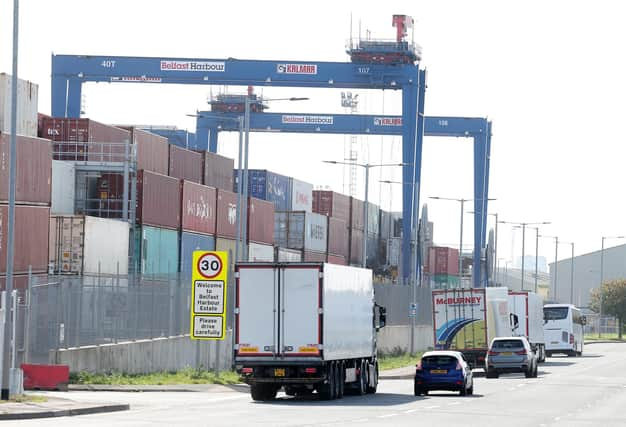Owen Polley: Now the flaws of the Windsor Framework will become all too apparent


That means we will see soon whether Rishi Sunak’s agreement, which creates a harder Irish Sea border than we have experienced so far, causes immediate disruption to businesses and shortages of goods, or whether these effects can be delayed or disguised for a while.
When the Northern Ireland Protocol proved unworkable, the government applied ‘grace periods’ and exemptions that were designed to keep trade moving between Great Britain and Northern Ireland. These measures, which covered, for example, parcels, medicines and, perhaps most importantly, food, now end.
Advertisement
Hide AdAdvertisement
Hide AdIn their place, new ‘green’ and ‘red’ lanes are being introduced. In order to send products through the green lane, which avoids some customs formalities, companies must sign up to a ‘trusted trader’ UK Internal Market Scheme (UKIMS), complete a swathe of paperwork and place ‘not for EU’ labels on some goods. This labelling will be required for a wider range of products from October 2024.
Most manufacturers will, anyway, be unable to declare the materials they buy ‘not at risk’ of entering the European Union and there will be little point in them signing up to UKIMS. They will have to use the red lane. Meanwhile, independent shops are likely to struggle with the new red tape, according to the Northern Ireland Retail Consortium.
The government, of course, still claims that its deal alleviated the worst aspects of the Northern Ireland Protocol, through which Boris Johnson first imposed the Irish Sea border.
That account has been challenged repeatedly, most notably by a House of Lords’ committee report. Last week, the University of Ulster’s senior economist, Dr Esmond Birnie, reiterated that, “The Windsor Framework will almost certainly increase those frictions (ie extra costs for businesses). This is because the various exemptions and grace periods, particularly relating to moving food products, now end.”
Advertisement
Hide AdAdvertisement
Hide AdThe most drastic outcome of the framework, according to Dr Birnie, will be, “a continuing process of realignment of the NI economy … NI is shifting from being a regional economy which is highly integrated within the UK into a more hybrid economy with a high degree of integration to the Republic of Ireland and the rest of the EU”.
This, of course, was an unstated goal of both Brussels and Dublin, when they pressed relentlessly for the Irish Sea border, as opposed to checks on goods moving between Northern Ireland and the south. This aim was always irresponsible and potentially destabilising, given the sensitivities of our constitutional position.
For that reason, ‘diversion of trade’ was included in the original protocol as a justification for either the UK or the EU triggering ‘Article 16’, which was intended as an emergency brake for the arrangements. Now, the government has all but accepted that companies will permanently buy more of their supplies from the Republic and Brussels’ single market.
Despite all the assertions to the contrary, none of this was inevitable, nor were there no credible alternatives to the Irish Sea border. Just because the EU quickly ruled out any proposals that would have lessened Northern Ireland’s problems, it doesn’t mean that none were available, or that it was acting reasonably or in good faith.
Advertisement
Hide AdAdvertisement
Hide AdThe ideas around ‘mutual enforcement’, for example, that were championed by the Centre for Brexit Policy (CBP), were the type of proposals that Brussels’ functionaries dismissed as ‘magical thinking’. The DUP leader, Sir Jeffrey Donaldson, endorsed a recent CBP paper that described mutual enforcement as “the key to restoring Stormont”.
The government, as well, previously included a form of mutual enforcement in its 2021 command paper, drafted by Lord Frost. But when the EU showed little appetite to solve the sea border problems, UK ministers lacked firmness in pressing their case. Eventually, Rishi Sunak dropped plans to use an act of parliament to repair Northern Ireland’s place in the UK internal market and championed the Windsor Framework instead.
Unfortunately, his government is now in full denial mode, and has been for months, even as multiple problems with its deal became apparent. It is not prepared to accept that the framework solved very little and delivered few of the things that it initially claimed.
Over the next period, then, the UK will be left with three choices.
Advertisement
Hide AdAdvertisement
Hide AdEither the government will be forced to implement the framework in a half-hearted and incomplete way, just as it did with the protocol, because it realises that the fully fledged version is simply not practical. Alternatively, Northern Ireland will continue to be edged out of the UK’s economic union, with all the political chaos that is likely to entail. The final possibility is that this government or a future administration will be forced to revisit the framework to some degree, as its flaws become ever more apparent.
Don’t expect the EU, under any of these circumstances, to show anything other than intransigence and high-handedness. And don’t expect its apologists, in Northern Ireland, the Republic and the rest of the UK, to do anything other than slavishly repeat Brussels’ propaganda, no matter how bad things get for businesses and consumers.
They either believe, genuinely, that every problem is solely attributable to Brexit, as if history stopped in 2016, or they are so committed to destroying the UK that any pain will be judged a necessary sacrifice.